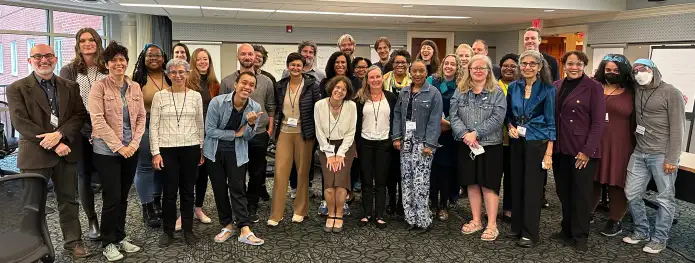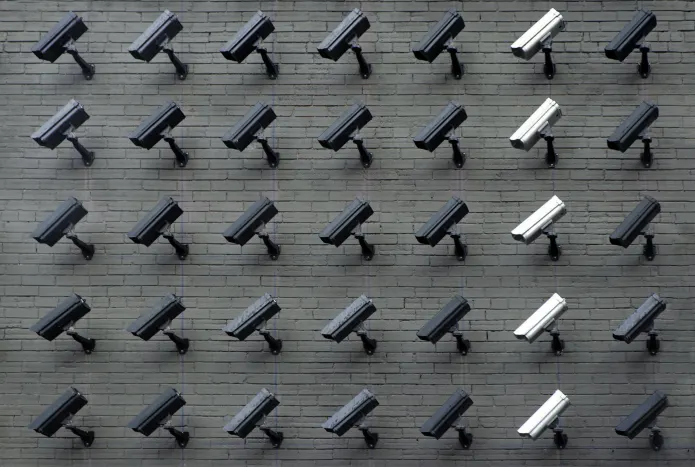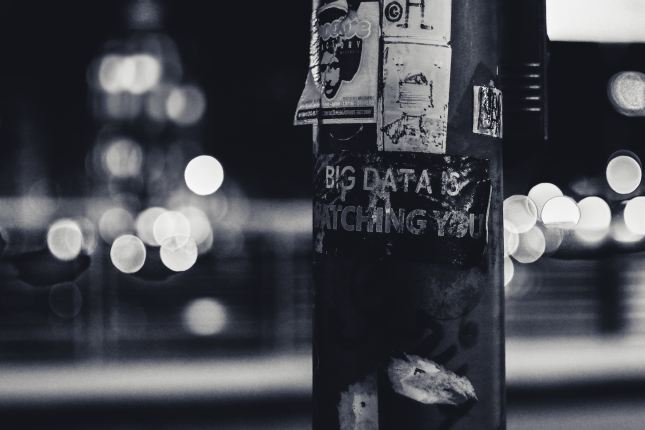SCI 2023 started on October 8. Five teams were selected to participate based on a request for proposals in the spring, and arrived in North Carolina’s Research Triangle region to work on projects based on this year’s theme of Trust. You can learn more about the teams and their projects here:
- Investigating the potential of open peer review on trust and diversity in scholarly communication
- Gowri Gopalakrishna, Serge P.J.M. Horbach, Veronique Kiermer, Tony Ross-Hellauer, Sonia Vasconcelos, Simine Vazire
- Resisting Surveillance in Scholarly Publishing
- Mark Swartz, Graeme Slaght, Kelly McElroy, Andrea Puglisi, Danielle Colbert-Lewis, lawrence maminta
- Scholarly communications and inclusivity: Solutions that help to bridge digital divide between countries
- Renise Johnson, Sabrina Dyck, Rachael Falu, Karen Tyrell, Anidza Valentin
- Trust and pre-truth science: The case of preprints
- François van Schalkwyk, Alice Fleerackers, Luisa Massarani, Chelsea Ratcliff, Yao-Hua Law, Mario Malički
- Trust and the archive: New methodologies for inclusion
- Patricia Akhimie, Kim F. Hall, Caroline McCaffrey-Howarth, Patricia A. Matthew, Ayanna Thompson, Karin Wulf
This post will feature some highlights from each day, and outcomes will be linked from the SCI 2023 page after this year’s program concludes. You can also follow our Twitter feed and the #TriangleSCI hashtag for more updates, and engage us in conversation there.
Happy to be able to announce the teams that will be participating in #TriangleSCI in October, and their projects on the theme of "Trust" in scholarly communication. Team names and participants are now up, with more project details linked from here soon! https://t.co/BJIEaexRIS
— Triangle Scholarly Communication Institute (@TriangleSCI) July 14, 2023
So excited to get to collaborate with @Mario_Malicki @Francois_fvs2 @chelseawriting @LuisaMassarani & @yaohualaw to look at preprints in journalism this October.
Dream team? I think so! https://t.co/yQSawcxK6E
— Alice Fleerackers (@FleerackersA) July 14, 2023
Patricia Akhimie, Kim Hall, Caroline McCaffrey-Howarth, Ayanna Thompson, Karin Wulf, and I will be working on the project “Trust & the Archive: New Methodologies for Inclusion” here. I can’t wait to get to work. @pakhimie, @ProfKFH, @CarolineMcCaff, @kawulf https://t.co/pytVGic47f
— tricia matthew (@triciamatthew) July 15, 2023
Beyond excited to take part in #TriangleSCI again, esp. to work on topics really close to my heart (diversity, trust, open peer review) with such a great team @gowrigopala, Serge Horbach, @verokiermer, Sonia Vasconcelos & @siminevazire #openscience https://t.co/aqdG7JmMnu
— Tony Ross-Hellauer (@tonyR_H) July 17, 2023
We're delighted that @carolinemccaff and her team have been awarded a residency in Oct 2023 at the Scholarly Communication Institute @TriangleSCI funded by the @MellonFdn for a project focused on 'Trust and the Archive: New Methodologies for Inclusion' https://t.co/xnGThQTYfG
— EdinburghArtHistory (@EdiArtHistory) July 27, 2023
One goal is to move from critique towards meaningful interventions & to build on work in progress by scholars of color. I’m glad to return to faculty life w/this project👊🏾
Trust and the Archive: New Methodologies for Inclusion | https://t.co/i3DBQa96fT https://t.co/10OkoJT38N
— tricia matthew (@triciamatthew) July 27, 2023
Excited to share that I’ll be attending @TriangleSCI as part of a team working on a project called "Resisting Surveillance in Scholarly Publishing". (1/2)
— Mark Swartz @markswartz@hcommons.social (@markswartz) August 1, 2023
In advance of our visit to @TriangleSCI in two weeks, we're still eager to hear your thoughts on issues of equity and trust in open peer review!https://t.co/xXjxlBzYZP#OpenScience @siminevazire @verokiermer @gowrigopala
— Tony Ross-Hellauer (@tonyR_H) September 25, 2023
Just created a list for people who will be at #TriangleSCI next week – at least those of us still on Twitter. Follow it here https://t.co/sruFeiYgpx if you want to keep an eye on what we're saying and doing.
— Triangle Scholarly Communication Institute (@TriangleSCI) October 3, 2023
A Sunday morning roam around @DukeU in the Autumn sun pic.twitter.com/mbLq3ZqhI9
— Dr Caroline McCaffrey-Howarth (@CarolineMcCaff) October 8, 2023
Welcome to North Carolina, #TriangleSCI teams! It’s a beautiful evening and we’re ready to get started on SCI 2023. pic.twitter.com/ySeb8rH06Y
— Triangle Scholarly Communication Institute (@TriangleSCI) October 8, 2023
Opening reception and introductions at #TriangleSCI this evening. It's going to be a great week – so many different backgrounds and professions and countries and organizations and kinds of expertise in the room – so much to learn from each other. pic.twitter.com/4Z5HNyKRV8
— Triangle Scholarly Communication Institute (@TriangleSCI) October 9, 2023
First day! Researchers, librarians, and journalists from across the world gather to brainstorm better ways to better communicate research to the public (and more). #trianglesci @RizzoCenter pic.twitter.com/CZ9j8GyQC0
— Law, Yao Hua (@yaohualaw) October 9, 2023
I'm attending first full day of the 2023 #TriangleSCI this morning. Was just talking with @paoloman — this model for collaboration requires a leap of faith, but the results and the process itself are rewarding.
— UNCScholComm (@UNCScholComm) October 9, 2023
Working Hard at the @TriangleSCI discussing trust in preprints and preprint media coverage. Wonderful Sunday and start of the week. @FleerackersA pic.twitter.com/kysXNMO3tK
— Mario Malički (@Mario_Malicki) October 9, 2023
It’s been an incredibly generative first day at #TriangleSCI. Also Karin Wulf bought us Rise biscuits for breakfast, @CarolineMcCaff’s first. pic.twitter.com/EXF06Lmw6y
— tricia matthew (@triciamatthew) October 9, 2023
Thinking and learning with these incredible women on our @TriangleSCI project Trust and the Archive: New Methodologies for Inclusion https://t.co/tXIdlE3ags pic.twitter.com/OZGuQPTV4x
— Dr Caroline McCaffrey-Howarth (@CarolineMcCaff) October 9, 2023
Great first full day at #TriangleSCI! Teams got started on their work, and in the afternoon introduced their projects to the whole cohort, and led wide-ranging discussions to build on their ideas for the next phases of their work.
— Triangle Scholarly Communication Institute (@TriangleSCI) October 10, 2023
"Investigating the potential of open peer review on trust and diversity in scholarly communication" team introducing their project at #TriangleSCI https://t.co/LHjuVGY17z pic.twitter.com/yi1lGyxvJQ
— Triangle Scholarly Communication Institute (@TriangleSCI) October 10, 2023
"Trust and pre-truth science: The case of preprints" team introducing their project at #TriangleSCI https://t.co/okmjI3zeib pic.twitter.com/YlhR1Iack9
— Triangle Scholarly Communication Institute (@TriangleSCI) October 10, 2023
"Resisting Surveillance in Scholarly Publishing" team introducing their project at #TriangleSCI https://t.co/ZpJkU9YOPL pic.twitter.com/mKbTx2aNqh
— Triangle Scholarly Communication Institute (@TriangleSCI) October 10, 2023
"Scholarly communications and inclusivity: Solutions that help to bridge digital divide between countries" introducing their project at #TriangleSCI https://t.co/blhnth8OH9 pic.twitter.com/keBgJOoY8b
— Triangle Scholarly Communication Institute (@TriangleSCI) October 10, 2023
"Trust and the Archive: New Methodologies for Inclusion" team introducing their project at #TriangleSCI https://t.co/qxIdvyeQKJ pic.twitter.com/pljO8cJ4pe
— Triangle Scholarly Communication Institute (@TriangleSCI) October 10, 2023
A beautiful evening at the @RizzoCenter as we prepare to head to dinner for #TriangleSCI pic.twitter.com/hBk7qniXea
— Triangle Scholarly Communication Institute (@TriangleSCI) October 10, 2023
Campus tour at @DukeU with #TriangleSCI participants pic.twitter.com/u9HW9Mhvs6
— Triangle Scholarly Communication Institute (@TriangleSCI) October 10, 2023
Dinner with #TriangleSCI at @JujuDurham pic.twitter.com/jJ9otXLIv4
— Triangle Scholarly Communication Institute (@TriangleSCI) October 10, 2023
Campus tour @DukeU by @TriangleSCI pic.twitter.com/FJiYHsyVCX
— Dr Caroline McCaffrey-Howarth (@CarolineMcCaff) October 10, 2023
What has happened is that Ayanna Thompson, Patricia Akhimie, @CarolineMcCaff, Karin Wulf, and I are eating biscuits and bacon and thinking about archives and accessibility. Thank you @TriangleSCI !! https://t.co/XP3kdHw2el
— tricia matthew (@triciamatthew) October 10, 2023
Really excited to be a part of this all-star team (also, don't we look like [very nerdy] supermodels?) @yaohualaw @chelseawriting @LuisaMassarani (MIA) @Mario_Malicki @Francois_fvs2 https://t.co/EzjcF5r1W5
— Alice Fleerackers (@FleerackersA) October 10, 2023
Our @TriangleSCI team hard at work! Working on research agenda for developing an evidence base about the pros and cons of open peer review (open review reports and/or open reviewer identities) for diversity & trust@gowrigopala @tonyR_H @verokiermer & Serge Horbach#TriangleSCI pic.twitter.com/2JEV7TZHbL
— simine vazire (@siminevazire) October 10, 2023
Afternoon meetings at #TriangleSCI with teams coming together to learn about each other's disciplinary practices. pic.twitter.com/5ohAaGdOGt
— Triangle Scholarly Communication Institute (@TriangleSCI) October 11, 2023
— Triangle Scholarly Communication Institute (@TriangleSCI) October 11, 2023
Thank you @NatlHumanities for hosting #TriangleSCI for a reception with Triangle scholars and students and colleagues this evening! pic.twitter.com/VYzAUx72qk
— Triangle Scholarly Communication Institute (@TriangleSCI) October 11, 2023
Visited the @NatlHumanities tonight pic.twitter.com/etuH1JB3pP
— Dr Caroline McCaffrey-Howarth (@CarolineMcCaff) October 11, 2023
Last night at the National Humanities Center.
Ayanna: We are taking pictures ON those stairs.
Me: I don’t think we are allowed to do that.
Ayanna: We are doing it!
Me: I’m not sure…
Also me: pic.twitter.com/br0hThgLfK— tricia matthew (@triciamatthew) October 11, 2023
Co-writing our future plans for our #TriangleSCI presentation. That’s the great @ProfKFH zooming in! pic.twitter.com/9kxNolHe6h
— tricia matthew (@triciamatthew) October 11, 2023
Wrapping up a rich week of brainstorming and discussions around building trust in scholarly communication. Thank you @TriangleSCI for bringing us all together! https://t.co/zLh8FgqOQ7
— Chelsea Ratcliff (@chelseawriting) October 12, 2023
Got to spend a week with this international dream team of #scicom researchers & practitioners (@FleerackersA @LuisaMassarani @yaohualaw @Mario_Malicki @Francois_fvs2). We’ve been discussing & articulating a research agenda on journalists’ use of scientific preprints @TriangleSCI pic.twitter.com/YHv7adOxi9
— Chelsea Ratcliff (@chelseawriting) October 12, 2023
No more snacks. #TriangleSCI 2023 has been a true gift.
Thank you, @TriangleSCI! pic.twitter.com/v7ectPcBSA
— tricia matthew (@triciamatthew) October 12, 2023
COVID has pushed many newsrooms to use pre-prints for stories. Will this practice grow or shrink? And how should newsrooms use them? @TriangleSCI brought us together to tackle these Qs. Diverse group we are. And I'm not even counting our owl. pic.twitter.com/ISHUcHhusi
— Law, Yao Hua (@yaohualaw) October 12, 2023
Thank you #TriangleSCI community for a great week together! Learned so much, made new friends, launched new projects, & had fun! Thanks as always to @MellonFdn for making this all possible, & to the @TriangleSCI advisory board & colleagues & @RizzoCenter for all their support. pic.twitter.com/E1wav81Mo7
— Triangle Scholarly Communication Institute (@TriangleSCI) October 12, 2023
Bringing people together to work on issues of equity and trust and a healthier and more just scholarly communications ecosystem is the best thing I get to do in my work. So happy to have spent an amazing week with this group at #TriangleSCI https://t.co/BEt0AgfpWm https://t.co/7qU9tYwXDA
— Paolo Mangiafico @paoloman@mastodon.social (@paoloman) October 12, 2023
Another wonderful TriangleSCI!
— Dene Grigar (@dgrigar) October 12, 2023
Thank you #TriangleSCI for this great experience and the opportunity to collaborate with other institutions in the development of new initiatives that will impact our scholarly communication services.
– Dr. Anidza Valentin, Director@GricUprm https://t.co/NQEkiuCUwa
— Biblioteca UPRM (@BibliotecaUPRM) October 12, 2023
What an amazing group of people! The diversity of perspectives emerging from this convening is truly amazing. And it definitely elevated every project coming out of this intense week. So grateful to @TriangleSCI for making this possible. Thank you 🙏 https://t.co/oSroF59cFz
— Veronique Kiermer (@verokiermer) October 13, 2023
Home after a fantastic week working with this wonderful group of women (plus Prof. Kim Hall on Zoom!) in the middle of the Research Triangle @TriangleSCI funded by @MellonFdn planning for a new research lab which will launch next year led by the incredible @triciamatthew pic.twitter.com/p7AUWVvMRI
— Dr Caroline McCaffrey-Howarth (@CarolineMcCaff) October 14, 2023





